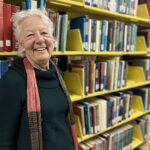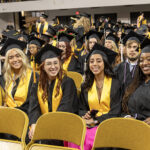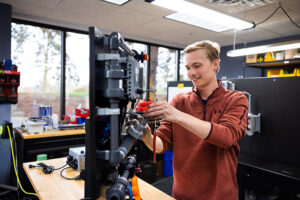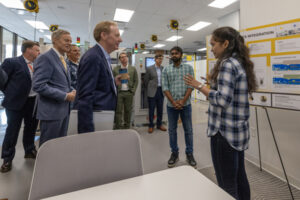- Elliot Patros
- Degree: BFA in Music Composition and Technology (minor in Philosophy)
- Hometown:Appleton, Wis.
- It’s a fact: He wrote his first piece of music when he was 6. That piano solo was recognized in a statewide competition for creative works by elementary school students.
For Elliot Patros, the Music Composition and Technology curriculum in the Peck School of the Arts is “set up to encourage students to approach the field from their own perspective.”
When he graduates in December, Patros emphasizes that he’ll be armed with the skills needed to problem-solve when presented with a “real-world” electronic music project.
“At UWM, the faculty gives you the tool set you need to figure out what you want to do and then be able do it,” says Patros. As an example, he’s already composed music that was performed professionally by the Chicago-based ensemble Dal Niente. The piece premiered as part of the Peck School’s Unruly Music Festival, held in March 2012 at the Marcus Center for the Performing Arts.
Collaborating with professional musicians was a revelation. “I had specific ideas about what I wanted to accomplish, but Del Niente’s members helped me express myself more clearly,” Patros says. “As professional musicians, their time is valuable, so rehearsals had to be very time-efficient. And the quality of their sight-reading was truly impressive. As a result, I could hear how a piece actually sounded at the first rehearsal, and keep or change parts of the piece right away.”
Patros began his UWM studies as a freshman in guitar but decided that course of study wasn’t a good fit for him. Music Composition and Technology seemed a “natural next stop” for Patros, who had been composing songs for years.
“Professor Jon Welstead, chair of the Music Composition and Technology Department, described their approach as very nontraditional,” Patros says. “I didn’t know what to expect, but I was excited about trying new things.”
The first step was extensive groundwork – listening to and studying a lot of contemporary compositions, as well as doing some composing. “Those first pieces were not my best work. But that’s how I began learning to express myself through contemporary music.”
While that was the foundation, his work “really took off” when Associate Professor Chris Burns taught Patros computer programming. Patros decided he needed to start inventing musical instruments to create the sounds he wanted for his compositions. The first step was using a laptop to make sounds that could be recreated consistently and suited the mood of a musical piece he was working on. Patros describes the process as “lots of trial and error, adding new features and figuring out how a person and a computer can interact to create music that will touch a listener.”
During summer 2012, Patros attended a workshop at Stanford University on “new music controllers” (or instrument design using computers). “The goal is to create something that is simple enough so that someone can pick it up and figure it out, but complex enough that the same person isn’t bored with it right away,” says Patros.
The course involved working with hardware and software. Patros used sensors including accelerometers to communicate with a computer. His “FMouse” translates physical movement through space into sound. Professor Burns describes it as “a pair of small devices which can be held one in each hand, and moved relative to one another to shape and alter electronic sound. Imagine a very high-tech accordion performance and you are starting to get the idea.” (For a demonstration, see the related video with Patros and the FMouse playing music.)
As another step towards his goal of a career in music, Patros exhibited a sound-art installation at “Unstable Systems,” a multimedia exhibit in Madison, Wis. Also during Spring 2012, he presented that same installation at the UW System Undergraduate Research Symposium.







